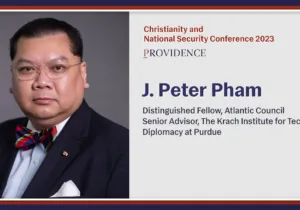President Trump’s purported remarks about “s—hole countries” have echoed off the world’s highest human rights authority—an echo being the usual response of a hollow institution.
After the controversy broke out, the UN’s Office of the High Commissioner on Human Rights (OHCHR) excoriated the president for his “shocking and shameful comments” lamenting the high rate of immigration from failed states.
“All of these go against the universal values the world has been striving so hard to establish since World War II and the Holocaust,” said OHCHR spokesman Rupert Colville. “This isn’t just a story about vulgar language. It’s about opening the door to humanity’s worst side. It’s about validating and encouraging racism and xenophobia that will potentially disrupt and even destroy the lives of many people.”
What’s most interesting is not the president’s remark, which has been thoroughly analyzed. The administration has contested the verbiage, and some at National Review minimized it as the president’s “inartfully stumbl[ing] on a truth” about nations lacking such pillars of a free society as religious liberty, private property, and the impartial administration of justice.
Instead, the notion that the UN’s less-charitable construction of his remarks violates “universal values” deserves further scrutiny. By discussing President Trump’s crude words in the same breath as the Holocaust, Colville magnifies the offense and, by extension, the heroism of his condemnation. However, the community of nations’ belief in racial equality, respect for human rights, or even opposition to open genocide falls well short of “universal.”
One may find a modern example in Hamas, presently exercising its second rule over the Gaza Strip. Its original charter announced its armed “struggle against the Jews”—not, pointedly, Israelis alone. In an effort to moderate its image, last year it adopted a new charter that uses ambiguous language—stating, for instance, that “Hamas does not wage a struggle against the Jews because they are Jewish.”
Unfortunately, human rights abusers do not confine themselves to words. As Colville parsed Trump’s turn-of-phrase, ethnic and cultural tensions burst into open violence across the globe. Turkey has intensified its campaign against ethnic Kurds. Myanmar is engaging in the genocide of Rohinga Muslims. China persecutes its Uighur Muslims, Tibetan Buddhists, and a growing share of its Christian population. Ethnic conflicts rage across Sudan, Nigeria, and sub-Saharan Africa.
Certainly “humanity’s worst side” was on display in Iran’s reaction to the nationwide protests that broke out just before the new year. Yet the UN’s reaction, by contrast, seems muted. On January 3, UN High Commissioner for Human Rights Zeid Ra’ad Al Hussein issued a statement saying, “I am deeply disturbed by reports that more than 20 people, including an 11-year-old boy, have died and hundreds have been arrested during the recent wave of protests in Iran.” Two days later, the UN escalated its condition to “very disturbed.” The agency managed stronger language while unsuccessfully lobbying Tehran not to execute a 19-year-old man who raped and murdered a six-year-old girl.
The dichotomy continues the odd moral calculus whereby the West reserves its most caustic rhetoric for the least consequential offenses, committed by the most democratic regimes. International human rights efforts may suffer in part because getting tough with nations that are already predisposed to respect human rights yields greater results. Such pyrrhic victories offset the UN’s failures—such as its manifest inability to safeguard the world’s most imperiled minority: Middle Eastern Christians.
Its efforts are also complicated by the fact that its minimal standards are not embraced by some members of the UN Human Rights Council, including Venezuela, Cuba, and Afghanistan.
Physician, heal thyself.
However, the greatest issue is that “universal values” do not exist. The values the UN extols are the root, cause, and greatest example of Western exceptionalism. Respect for the human rights of every human being—irrespective of race, creed, sex, or ethnicity—flows from the Scriptural premise that every individual is created in imago Dei (the image of God) and has inestimable value and dignity. The modern West, denuded of the faith that once inspired those values, wishes to maintain the emotionally satisfying principles to which they gave birth: tolerance, conscience rights, concern for the poor, stewardship of the natural creation. Yet without a basis in a universally valid moral code, European Union leaders can offer no reason anyone should cherish these values above any other worldview.
This crisis of faith coincides with the fact that a growing number of citizens in the West, inspired by another faith, reject both the Judeo-Christian foundation and the “European values” it supports. According to an ICM Unlimited and Channel 4 survey, only one-third of British Muslims would report a fellow Muslim to the police if they knew he was involved in terrorism in Syria. A quarter would replace British common law with Shari’a. Meanwhile, evidence shows that migrants are bringing a renewed anti-Semitism to Germany. The conflicting values—over human life, women’s rights, and the most fundamental tolerance for other faiths—too often explodes into violence in the birthplace of the purported “universal values,” including London, Paris, and Berlin.
That realization ought to cause the UN to reconsider the primary source and summit of human rights, as well as the targets on which that global body focuses its limited energy.
—
Rev. Ben Johnson is an Eastern Orthodox priest and the senior editor of the Acton Institute’s Religion & Liberty Transatlantic website. His views are his own.
Photo Credit: Rupert Colville, spokesperson for the UN High Commissioner for Human Rights (OHCHR). UN Photo by Jean-Marc Ferré.






 Sponsor a student for Christianity & National Security 2024
Sponsor a student for Christianity & National Security 2024